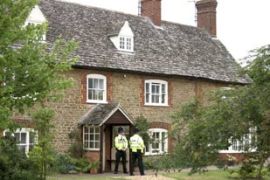Kelly death was ‘textbook suicide’
Pathologist’s response follows call for full inquest into weapons inspector’s 2003 death.

The death created a major crisis for Tony Blair, the then UK prime minister. Britain took part in the US-led invasion of Iraq, which began in March 2003.
Kelly’s treatment
Hunt has told the Sunday Times newspaper he was horrified at the way the Blair government had treated Kelly.
“I felt very, very sorry for David Kelly and the way he had been treated by the government … I had every reason to look for something untoward and would dearly love to have found something,” Hunt said.
“It was an absolute classic case of self-inflicted injury. You could illustrate a textbook with it.
“If it were anyone else and you were to suggest there’s something foul about it, you would be referred for additional training. I would welcome an inquest, I’ve nothing to hide.”
‘Thick clots of blood’
Responding to the questioning of the suicide verdict by eight senior figures, Hunt said: “Nobody would have seen the amount of blood at the scene.
“In actual fact there were big, thick clots of blood inside the sleeve, which came down over the wrist, and a lot of blood soaked into the ground. They might not have seen it, but it was there and I noted it in my report.”
Hunt said that there was “nothing to suggest” the body had been moved, another claim from critics of investigation.
He said a fingertip examination of Kelly’s body and DNA testing found no evidence of third-party involvement.
Kelly’s death was caused by the bleeding, severe heart disease and an overdose of painkillers, he found.
Kelly was the most experienced British expert involved in UN inspections in Iraq intended to prevent the government of Saddam Hussein from acquiring weapons of mass destruction.
‘Sexed-up’ intelligence
In the run-up to the invasion, Blair’s government published a dossier of intelligence about Saddam’s purported weapons of mass destruction in a bid to strengthen its case for going to war, including a claim that they could be deployed within 45 minutes.
After the “sexed up” dossier claim, the government was furious and sought out the source.
In the wake of the US-led invasion, no such weapons were found.
Following Kelly’s death, Charles Falconer, then the government’s chief law officer, suspended an inquest into the death before an inquiry began, and the inquest was never resumed.
The inquiry concluded “the principal cause of death was bleeding from incised wounds to his left wrist which Dr Kelly had inflicted on himself with the knife found beside his body”.